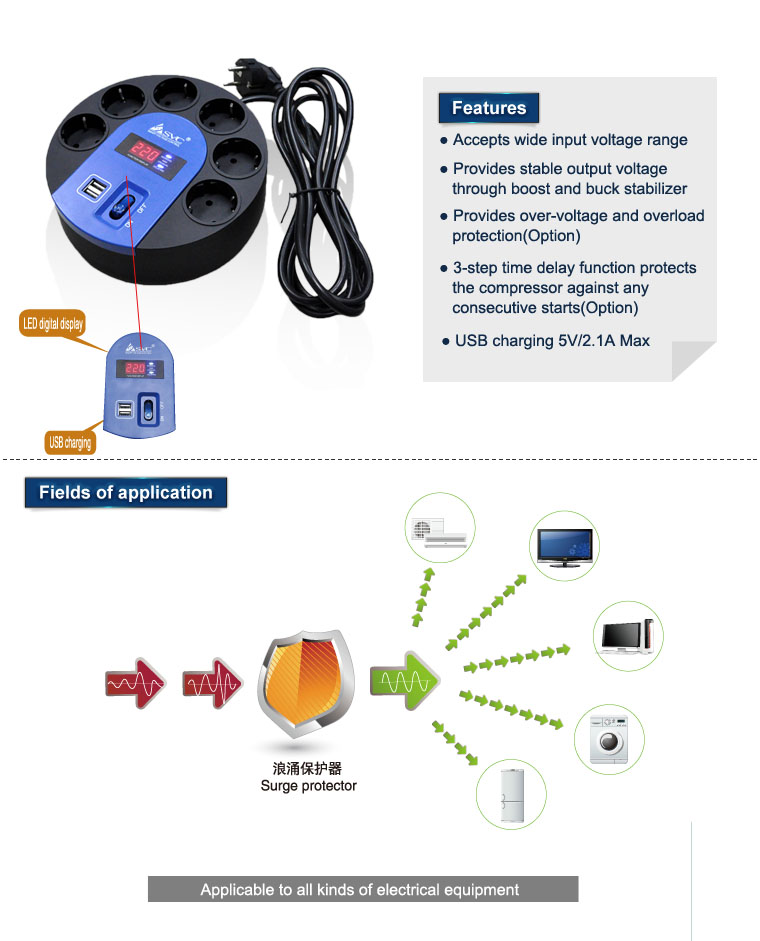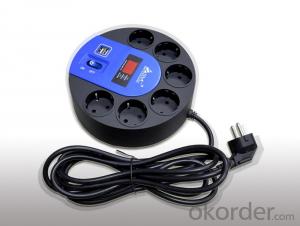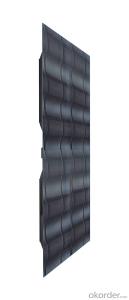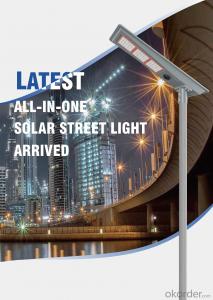Electric Socket/ Euro Industrial Multi Led Display USB Universal Electric Socket
- Loading Port:
- China main port
- Payment Terms:
- TT OR LC
- Min Order Qty:
- 20 carton
- Supply Capability:
- 10000 carton/month
OKorder Service Pledge
Quality Product, Order Online Tracking, Timely Delivery
OKorder Financial Service
Credit Rating, Credit Services, Credit Purchasing
You Might Also Like
Euro Industrial Multi Led Display USB Universal Electric Socket


1. Wide range of input voltage
2. Provides stable output voltage and overload protection(Optional)
3. Provides over-voltage and overload protection(Optional)
4. 3-steps time delay function protects the comptessor against any consecutive starts (Optional)
5. USB charging 5V/2.1A max

| Model | G-2006 | G-4006 |
| Voltage range | 180-245Vac | |
| Current | 10A | |
| Insulation voltage-withstand | 1500 / 1min 2000V 3sec | |
| Insulation resistance | ≥100 | |
| Power cord | Cross-sectional area:3*0.75 | |
| Operating life | 10000 times | |
| Net weight (kg) | 0.55 | |
| Environment | Temperature 0℃~40℃ | |
- Q:Are solar energy systems environmentally friendly?
- Yes, solar energy systems are environmentally friendly. They produce clean, renewable energy by harnessing the power of the sun, which reduces greenhouse gas emissions and air pollution. Solar energy systems have a minimal impact on the environment, as they do not consume water or produce harmful byproducts. Additionally, they help mitigate climate change and contribute to a more sustainable future.
- Q:What is the impact of roof orientation on the performance of solar panels?
- The impact of roof orientation on the performance of solar panels is significant. The orientation of the roof determines the amount of sunlight that the panels receive throughout the day. Ideally, solar panels should be installed on roofs that face south in the northern hemisphere and north in the southern hemisphere for maximum exposure to sunlight. East and west-facing roofs can still generate electricity, but their output may be lower. Additionally, the tilt angle of the roof can also affect the performance of solar panels. By optimizing roof orientation and tilt, the efficiency and productivity of solar panels can be greatly enhanced.
- Q:Can solar energy systems be used in powering airports or transportation hubs?
- Solar energy systems have the capability to power airports and transportation hubs. By installing solar panels, we can harness renewable and sustainable energy from the sun. These panels can be positioned on airport buildings' roofs, parking lots, or the surrounding ground. The utilization of solar energy in airports and transportation hubs is multifaceted. It can generate electricity to power lighting systems, security cameras, and other electrical equipment within the airport premises. Solar power can also be used to charge electric vehicles like electric buses or airport shuttles. This promotes a cleaner transportation system and reduces carbon emissions. In addition, solar energy systems serve as a reliable backup power source during emergencies or power outages. This is particularly crucial for airports, as continuous operations and safety measures must be maintained. Recently, various airports worldwide have adopted solar energy to decrease their carbon footprint and operating expenses. For example, Cochin International Airport in India achieved the distinction of being the world's first completely solar-powered airport in 2015. It generates surplus electricity that can be returned to the grid. Overall, integrating solar energy systems into airports and transportation hubs is both environmentally friendly and economically advantageous in the long term. It diminishes reliance on fossil fuels, reduces energy costs, and contributes to a more sustainable and greener transportation infrastructure.
- Q:Are there any insurance requirements for installing a solar energy system?
- Yes, there are insurance requirements for installing a solar energy system. While the specific requirements may vary depending on the location and individual circumstances, it is generally recommended to have appropriate insurance coverage in place when installing a solar energy system. This is important as it helps protect your investment and provides financial security in case of any unexpected damages or accidents. One of the most common insurance requirements for solar energy systems is property insurance. This covers any damage or loss to the physical components of the system, such as solar panels, inverters, and batteries. Property insurance typically protects against risks like fire, theft, vandalism, and natural disasters. Additionally, liability insurance is often necessary when installing a solar energy system. This coverage helps protect you from potential legal claims arising from accidents or injuries that may occur during the installation or operation of the system. Liability insurance may also provide coverage for any damage caused to neighboring properties. In some cases, if you are financing your solar energy system through a loan or lease, the lender or leasing company may require specific insurance coverage as a condition of the agreement. These requirements may include certain coverage limits, additional insured endorsements, or even specific insurance providers. It is important to consult with your insurance provider and solar installer to ensure that you have the appropriate insurance coverage in place before installing a solar energy system. They will be able to guide you through any specific requirements or recommendations based on your location and individual circumstances.
- Q:Can solar energy systems be used in educational settings for teaching purposes?
- Yes, solar energy systems can definitely be used in educational settings for teaching purposes. They provide a practical and hands-on way to teach students about renewable energy sources, environmental sustainability, and the benefits of solar power. By using solar energy systems, students can learn about the science behind solar energy, understand how it is harnessed, and even participate in the installation and maintenance processes. This interactive approach not only enhances their understanding of solar power but also promotes critical thinking and problem-solving skills. Additionally, solar energy systems in educational settings serve as a great demonstration of sustainable practices, inspiring students to adopt eco-friendly behaviors and contribute towards a greener future.
- Q:What is the cost of installing a solar energy system?
- The cost of installing a solar energy system can vary depending on various factors such as the size of the system, the type and quality of solar panels used, the complexity of the installation, and any additional equipment required. On average, the cost of installing a solar energy system can range from $10,000 to $30,000 or more. However, it is important to note that there are various incentives and tax credits available that can significantly reduce the upfront cost of installation. Additionally, over the long term, installing a solar energy system can result in significant savings on electricity bills, as the system generates clean and renewable energy, reducing reliance on traditional energy sources. It is advisable to consult with a professional solar installer to get an accurate estimate based on your specific requirements and location.
- Q:How do solar energy systems impact the reliability of the electricity grid?
- Solar energy systems can have both positive and negative impacts on the reliability of the electricity grid. On one hand, solar energy systems can enhance grid reliability by diversifying the energy sources and reducing reliance on traditional fossil fuel-based generation. This can help to mitigate the risk of disruptions caused by fuel supply shortages or price fluctuations. Additionally, solar energy systems can often be installed at or near the point of energy consumption, reducing transmission and distribution losses and improving overall system efficiency. On the other hand, solar energy systems also present challenges to grid reliability. As solar power generation is intermittent and dependent on weather conditions, grid operators need to manage fluctuations in solar output to ensure a stable electricity supply. This requires the integration of smart grid technologies, energy storage systems, and advanced forecasting methods to balance supply and demand. Failure to effectively manage these challenges can result in voltage fluctuations, grid instability, and potential grid failures. Overall, with proper planning, grid integration, and technological advancements, solar energy systems can positively contribute to the reliability of the electricity grid. However, careful management and investment in grid infrastructure and energy storage solutions are essential to address the intermittency issues associated with solar power generation.
- Q:Can solar energy systems be used in powering wineries or breweries?
- Yes, solar energy systems can be used to power wineries or breweries. Solar panels can be installed on the roofs of the buildings or in nearby open areas to generate clean and renewable electricity. This can help wineries and breweries reduce their dependence on fossil fuels, lower their energy costs, and contribute to a more sustainable and environmentally-friendly operation.
- Q:Can solar energy systems be used in powering theme parks or water parks?
- Yes, solar energy systems can certainly be used to power theme parks or water parks. These types of parks consume a significant amount of energy due to lighting, water pumps, rides, and various other facilities. Solar panels can be installed on rooftops, parking lots, or dedicated areas to harness sunlight and convert it into electricity. This renewable energy source can help reduce operating costs, decrease carbon emissions, and promote sustainability in the entertainment industry.
- Q:How do solar energy systems impact waste reduction?
- Solar energy systems have a significant impact on waste reduction by reducing the reliance on fossil fuels, which in turn decreases the production of harmful pollutants and greenhouse gas emissions. Additionally, solar panels have a long lifespan and require minimal maintenance, leading to reduced waste generation compared to traditional energy sources.
1. Manufacturer Overview |
|
|---|---|
| Location | |
| Year Established | |
| Annual Output Value | |
| Main Markets | |
| Company Certifications | |
2. Manufacturer Certificates |
|
|---|---|
| a) Certification Name | |
| Range | |
| Reference | |
| Validity Period | |
3. Manufacturer Capability |
|
|---|---|
| a)Trade Capacity | |
| Nearest Port | |
| Export Percentage | |
| No.of Employees in Trade Department | |
| Language Spoken: | |
| b)Factory Information | |
| Factory Size: | |
| No. of Production Lines | |
| Contract Manufacturing | |
| Product Price Range | |
Send your message to us
Electric Socket/ Euro Industrial Multi Led Display USB Universal Electric Socket
- Loading Port:
- China main port
- Payment Terms:
- TT OR LC
- Min Order Qty:
- 20 carton
- Supply Capability:
- 10000 carton/month
OKorder Service Pledge
Quality Product, Order Online Tracking, Timely Delivery
OKorder Financial Service
Credit Rating, Credit Services, Credit Purchasing
Similar products
New products
Hot products
Related keywords




























